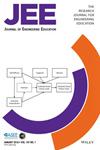Exploring engagement narratives among self-identified Hispanic women's experiences in engineering counterspaces
Abstract
Background
Diversity, equity, and inclusion efforts in higher education are increasingly recognizing the importance of understanding students' lived experience. More research is needed to deeply and contextually uncover voices, meanings, and stories that are enveloped within the complex realities of Hispanic women in engineering.
Purpose
While the Latiné/x/a/o, Hispanic women population is one of the fastest growing ethnic groups in the United States, they receive only 3% of engineering undergraduate degrees. This research explored how self-identified Hispanic women experienced engagement outside of class.
Design/Method
This exploratory qualitative research employed narrative inquiry design using a paradigmatic analysis method. We conducted two in-depth interviews with five undergraduate engineering students who self-identified as international Hispanic women.
Findings
By examining the narratives through a novel synthesis of a socio-ecological framework of engagement and community cultural wealth, we identified three themes that tell the story of students' experiences outside of class: (i) Perceived benefits and level of involvement informed student dispositions and aspirational capital in counterspaces; (ii) Linguistic capital served as the entry point for receiving social and navigational capital; and (iii) Cultural and linguistic similarities provide a counterspace where students gained the drive, disposition, and aspiration to persist in engineering.
Conclusions
The findings identified the capital that drove students to engage outside of the classroom and capital they gained in return. Out-of-class activities provided a counterspace for Hispanic women in engineering that supported their sense of belonging, ability to navigate engineering, and professional development. Based on these findings, we provide recommendations for engineering education and research.


 求助内容:
求助内容: 应助结果提醒方式:
应助结果提醒方式:


